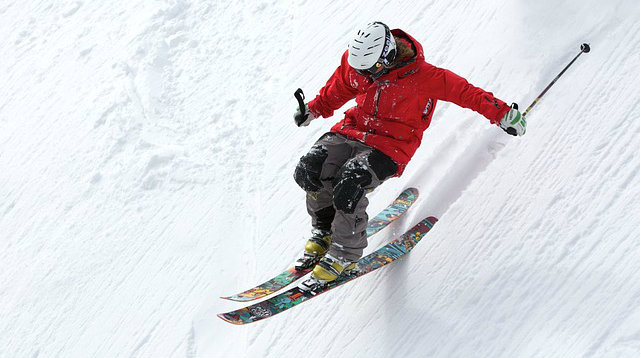 Reading Time: 6 minutes
Reading Time: 6 minutesWhen I first learned to ski, I was in junior high. I was a late bloomer, and I was old enough to feel the pain of being judged by my peers. Old enough to know the feeling of failure. Old enough to know that when you fall, you feel pain and you can get hurt in the process.
With that as my backdrop, I was full of apprehension on my first day of skiing. My buddies, who were all experienced skiers, decided to skip the bunny slope and take me right up the blue chair for a challenging first run. That run ended up being the longest run of my life.
It took me the better part of an hour to navigate and “snow-plow” my way down to the safety of the lift line. To say I was intimidated by my friends, the conditions, and the terrain would be an understatement. My friends had thrown me to the wolves and I was terrified.
But I also knew the only way forward was down the mountain — so down I went.
Admittedly, it wasn’t the smartest idea to go down a more advanced run as a beginner. Then again, there’s an interesting thing that happens when you’re faced with no choice but moving forward — you figure out a way. Thankfully, while my friends were much better skiers, they were also good-natured and caring, so they waited patiently and pushed me to do my best, all the while giving me grief as good friends tend to do.
While that skiing episode sticks in my mind as particularly defining, the intimidation factor involved in being a beginner is something I’ve experienced countless times in my life. Whether you’re scaling a mountain, learning to find your way down one, or starting a new fitness routine, being a beginner can be overwhelming and scary.
So here’s my advice on how to navigate your way into the world of exercise and fitness whether you’re fourteen or 64.
Intimidation Is a Good Litmus Test
One of life’s cruel ironies is that human beings are hardwired to seek two opposing forces simultaneously — comfort and growth. Comfort is an alluring trap: the afternoon nap, the bag of chips on your sofa, the love and support of those who root for and love you unconditionally. And while rest, relaxation, and blind love are indeed comforting, growth lies beyond these shallow waters.
Intimidation is a good litmus test for your progress. If you’re intimidated by your surroundings, that’s a good sign. Progress lies beyond the safe waters. Start shallow, but remember, the only way you can learn to swim is to take your feet off the bottom and wade out into the deep.
Your Safety Is Your Responsibility
One of the triggers of intimidation is fear of a new environment and the perceived threat to physical safety. Safety is of paramount importance, so it’s indeed critical that we recognize this emotion and progress one step at time. But this can be challenging when we embark on a new venture in fitness or sport. Your adrenaline may kick in and the excitement of a newly defined goal can cloud the better judgment of starting slow.
To use an analogy, you as an adult are responsible for how much you eat at a restaurant (regardless of how much you are served). Similarly, you are responsible for how hard you push yourself when it comes to physical activity and exercise. If your friends happen take you down an advanced skiing run as a beginner, your responsibility is to find a safe way down, not keep up with them.
When you need a break, take it. When you need help, ask for it. The trick is to balance the opposing forces of comfort and growth – go slow and be safe, but remember that growth occurs beyond the comfort.
Find a Tribe That Pushes You to Be the Best You
The people around you matter immensely when it comes to lasting success. Working out can be a lonely and grueling endeavor. But as I learned though my skiing buddies, community and the group psychology of competition can help fuel your progress.
I improved quickly at skiing in no small part because everyone I skied with was a much better skier than me. It’s intimidating to be in an environment where everyone is more proficient than you are, but it’s also the best way to improve rapidly.
One caveat: watch out for ego in a group dynamic, both yours and theirs. Friendly competition and light-hearted ribbing are part of life, but safety and real progress depend on mindfulness and genuine support. Make sure any group exercise program or physical activity you participate in requires checking your ego at the door.
Find a Coach That Will (Safely) Push You
The best coaches are a blend of great teachers, communicators, and students themselves. But more than anything, a great coach is defined as someone who gets the very best efforts (and results) from their students. That sweet spot in their ability to motivate comes down to the right mixture of empathy and high expectations. A great coach will feel your pain, yet demand your best.
The critical defining factor of a good coach is truthful communication. Like a good doctor, a masterly coach tells you what you need to hear, not necessarily what you want to hear. Look for a coach who listens, but helps you push yourself.
Pick a Craft, Not a Means to an End
One of the most daunting forms of intimidation is physical intimidation. As someone who boxed for years, I can attest to how intimidating it is to be in a room (or a ring) with bigger, stronger, and fitter individuals. But boxing with bigger men was less scary than I thought it would be. Here’s why: we were there to get better at boxing, not compare bodies.
Have you ever met a passionate calorie burner? No? Well, how about a passionate artist? People who view their sport or exercise as a craft tend to be disciplined learners dedicating to honing that craft. Conversely, people who simply exercise to manipulate their body may fall into the trap of trying to keep up with the Joneses — that is, thinking someone is always going to a step ahead of you and feeling intimidated by their physique.
But when you pick a craft to perfect, you’re worried only about improving that craft, not living up to some unattainable or unnatural expectation. The silver lining in picking the right craft, if you choose wisely, is that you’ll get the body you desire as well!
The Final Word on Getting Past Intimidation
I had coffee a few years ago with a colleague who told me that when she picks a new activity, job, or life direction she looks for the sensation of butterflies – that wonderful sense of anticipation and excitement, mixed with anxiety and nervous energy. When people say “go with your gut,” they are referring to tapping into that butterfly sensation.
We’ve all felt butterflies on a first date or a first day at work. Feeling butterflies — and the feeling of being a little intimidated — is part of life. Those butterflies are also a good way to know you’re in the right place.














